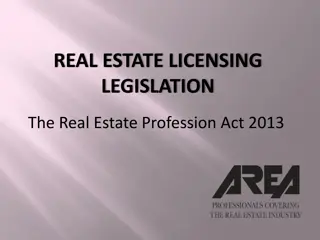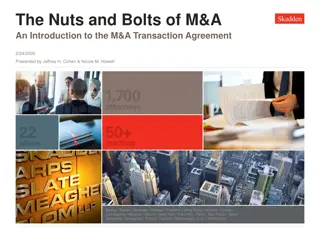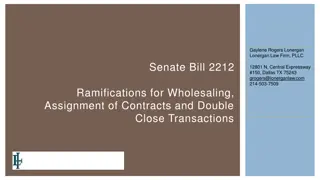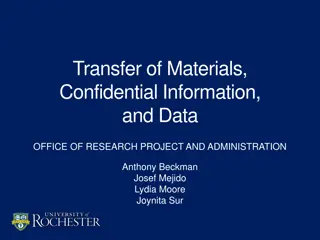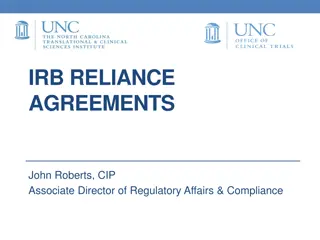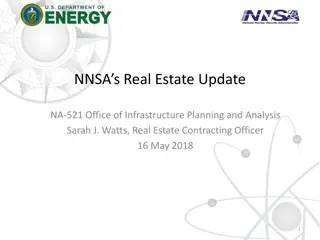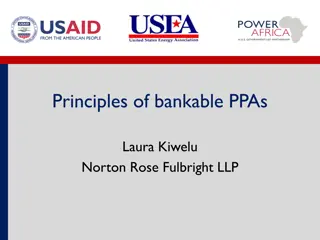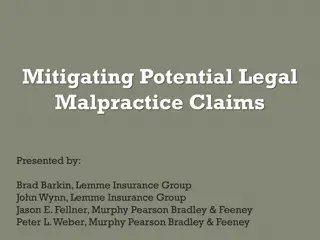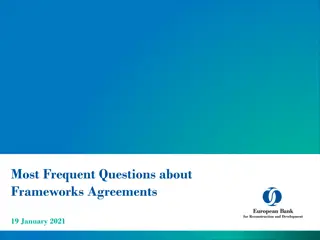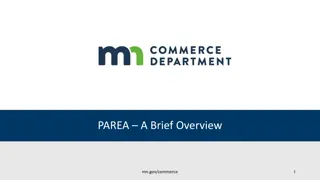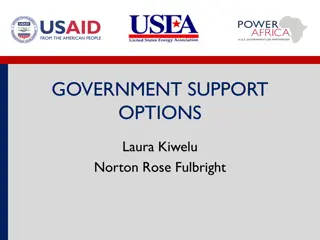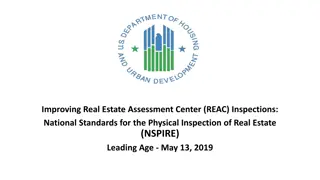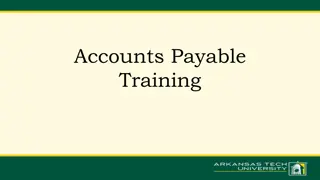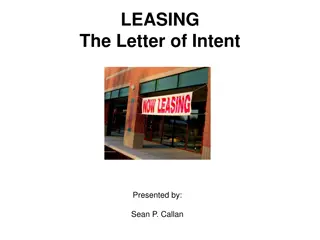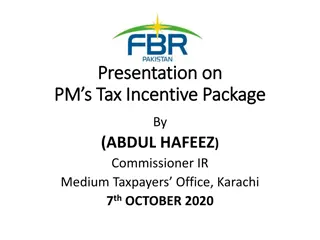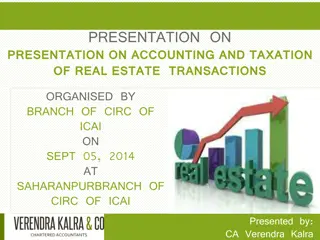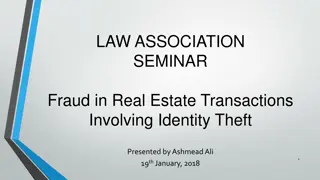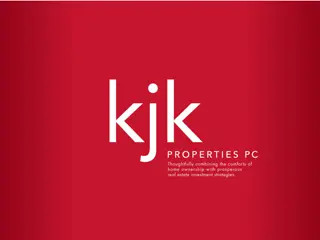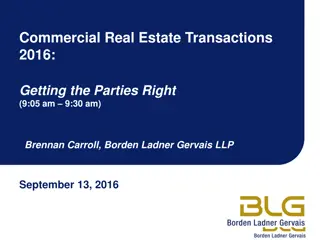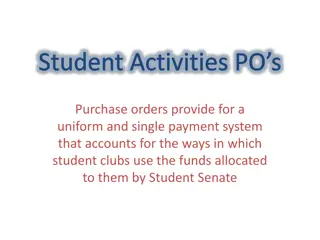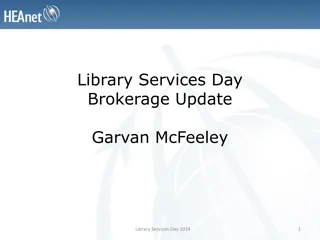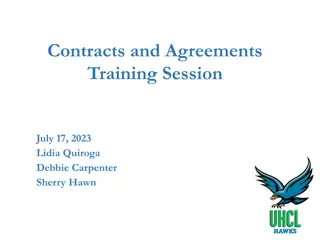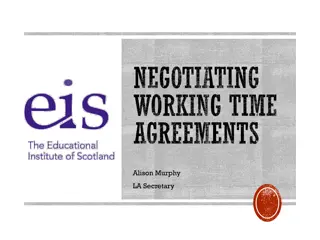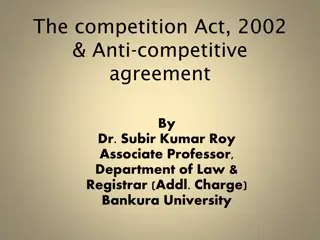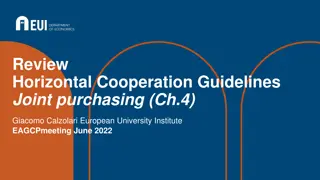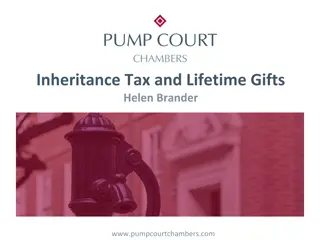Real Estate Agreements and Purchase Forms Overview
Explore a variety of real estate forms and agreements used in property transactions, including sales agreements, listing contracts, buyer representation agreements, and more. Understand the specifics of each document and their importance in buying or selling property.
Download Presentation

Please find below an Image/Link to download the presentation.
The content on the website is provided AS IS for your information and personal use only. It may not be sold, licensed, or shared on other websites without obtaining consent from the author. Download presentation by click this link. If you encounter any issues during the download, it is possible that the publisher has removed the file from their server.
E N D
Presentation Transcript
Form 100 APS Sale Form 101 APS CONDO Form 200 Listing Agreement (gives authority to offer for sale) Form 201 Seller Customer Service Agreement Designed for properties that are not listed Form 300 Buyer Representation Agreement Form 301 Cancellation of Buyer Representation
Form 320 - Confirmation of Co-Operation and Representation This must be filled when offer is made Indicates which brokerage is working with which party Indicates how much commission will be paid to co- operating brokerage Buyer and seller must both sign this document The salesperson/broker can sign it on behalf of the brokerage and bind the brokerage
OREA Agreement of Purchase and Sale for new homes is not available in Ontario currently The Agreement of Purchase and Sale applies to resale homes in Ontario It UFFI, CVA and other clauses that only apply to resale properties New home agreements are normally drafted by lawyers that represent the builders
Agreement of Sale/Agreement for Sale = agreement for purchase of real property in which the seller retains title of property until a specified future event occurs Event/date stipulation may include: When full payment of property price has been made When buyer has accumulated sufficient down payment and the Seller feels comfortable providing When enough payment is made to pay difference between existing mortgage and the parties
Agreement of Purchase and Sale = outright purchase of the title that entitles buyer to own and occupy property Fee simple ownership is always on title while right to use a property for a specified period of time is not on title
It contains the following: 1. Names of buyer(s) and seller(s) John and Jane Doe is not acceptable; it must be John Doe and Jane Doe Middle names can be initialized but it s still best to write the middle name out in full 2. Property address, upper tier (refers to provincial government) and lower tier (refers to municipal government) are all required 3. Frontage (50 feet), Depth (100 feet) [50 feet by 100 feet], legal description are required (frontage and depth must be in same unit) Easements on the property should also be stated
4. Deposit, purchase price in words and figures which must match 400,000 = Four Hundred Thousand 5. Deposit ID Verification is the first FINTRAC Requirement You must keep an identification record for all transactions involving brokerages In case multiple brokerages are involved, both must have the form signed by both buyer and seller Forms must be retained for five years
When must buyer give cheque to listing brokerage? Either upon acceptance or otherwise described in agreement on page 1 of form 100 Subsequent deposits accounted for in Schedule A (page 6) Or upon acceptance (this is the standard) REBBA 2002 says at the earliest practicable opportunity, but the agreement states that it should be delivered within 24 hours of the offer being accepted Herewith means you have the cheque with you When you fax over the offer, you also have to fax a copy of the cheque to the listing brokerage You must also deliver it, for which an arrangement may be outlined in Schedule A/B etc.
Receipt of funds is the second FINTRAC requirement This is necessary for all real estate transactions except: If funds are received from a public body or financial entity that buys or sells the property If the deposit does not go into the trust account of a real estate brokerage (paid directly to the builder or lawyer) If it is a large transaction (of over $10,000) and appropriate record is prepared If both the buyer and the seller are represented, the Agent of the Buyer must prepare this record and retain it for at least five years In case only a listing brokerage is involved, it must make the record
Five day provision REBBA 2002 requires that a brokerage deposit funds into a Real Estate Trust Account within 5 banking/business days or 7 calendar days Business days are all days except Saturdays, Sundays and statutory holidays normally 5 banking/business days in a week Time is of the essence when handling deposits Five day provision = minimum standard; you should try depositing the money as soon as practically possible Brokerage must maintain Real Estate Trust Account in which all monies coming for the possession of brokerages for other persons Deposit related money cannot go to any other account Property other than money may be held in this account (such as investment certificates)
Interest earned on deposit against purchase price is payable to the party making the deposit This is because the deposit is merely held in trust and the brokerage does not actually own this money Same principle as rent deposits Accrued interest must be disclosed to the depositor/buyer and they have a legal right to it unless they agree otherwise Disclosure must be made through means prescribed in a clause in Schedule A, which should also state how buyers may collect such interest and other information such as the minimum amount of accumulation The brokerage can only return a deposit if: 1. buyer, seller, listing brokerage and co-operative brokerage 2. Mutual consent/mutual release/release agreement signed by Court authorizes disbursement of the deposit
Unclaimed money If the deposit money is sitting unclaimed in the trust account for over two years, or if the money has been held for over one year and the depositor cannot be located, the money held in trust, if over $25, shall be transferred to: 1. The administrative authority (RECO) OR 2. If there is no administrative authority, the Minister of Finance Broker of Record has authority to make deposits/withdrawals from the Trust Account He must sign off on all transactions If Broker of Record is not available, a signing authority may be employed This must be another broker RECO must be notified of the appointment if brokerage is a sole proprietorship, right cannot be delegated because Broker in Record is the Broker in Record and Owner
Proceeds or Crime (Money Laundering and Terrorist Financing) Act lays down requirements regarding identification and receipts of deposit Brokerages must report cash deposits of $10,000 or more within 24 hours of being made Cheques do not need to be reported All other transactions must be reported within 15 business days Suspicious transaction indicators A single buyer buys a large number of houses (e.g. 10 houses) within a short period of time (e.g. 10 days) without inspecting them = a suspicious transaction that must be reported to FINTRAC
6. Irrevocable Offers are typically made by the buyer to the seller, but the seller may also make an offer to a buyer Offers are irrevocable so long as they are alive This means that an offer may not be revoked within the time period specified by the party making the offer If you submit an offer with an irrevocable of 3 days, you cannot take back the offer during those 3 days Unless the contract is made without seal Contracts without seal may be revoked However, this revocation must be communicated If the offer is not accepted, it will lapse and become null and void and cannot be accepted
Lapse may also occur if you fail to meet a deadline of a condition in the Agreement, such as acquiring a mortgage A counter offer is made by the buyer or seller, depending on the party that made the original offer 7. Check that all dates are in progressive order This means that dates should be mentioned starting from the date the agreement was made and end at the closing date, with dates in between in chronological order 8. Completion Date Also known as closing date Can be anything the parties want it to be Pre-print on Form 100 Clause 2 says closing shall be no later than 6:00PM
Actual date of completion must be filled out by the salesperson/broker on behalf of the client/customer Closing must occur on a bank/business day and not on a holiday or weekend 9. Notices (Clause 3) Both listing and co-operative brokerages have authority to send and receive written notices on behalf of the buyer and seller for purposes related to the transaction Fax/e-mail is required in case co-operating brokerage is involved, but not if there is multiple representation (dual agency) Clause 3 only applies to faxes only if fax number inserted
It does not extend authority to co-operating brokerage if the buyer is a customer (it cannot send/receive for customers) Documents should be delivered to buyer/seller customers directly as receipt by their brokerages will not be confirmation that the customer has actually received the documents Co-operating brokerage s fax number not included when customer is a buyer because this would imply representation agreement where there is none 10. Title Search Date (Clause 9) It must be done before closing but before all conditions are filled (called requisition date) Must be done within 5 (min) to 30 (max) days before closing; typically done 2 weeks before closing date
Lawyer must check Root of the Title Any issues must be reported by legal counsel within the requisition period Root of title issues refer to fundamental title issues Non-title search Things that are not related to the title may also be checked, such as easements, status of property taxes and outstanding utility bills 11. Future Use (Clause 9) Clause 9 states that future use of property is set out by the agreement If the agreement says it is a single-family residential home, there is no guarantee that it can be used to operate a business from in five years A condition may be inserted in Schedule A to protect buyer
12. Title (Clause 10) Buyer is entitled to good title but must accept title subject to any easements and restrictive covenants Title insurance specifically excludes fire insurance, which MUST be purchased by the buyer separately Buyers may insist upon inserting a fire insurance condition clause for cottage properties, which would enable them to back out of the deal if the insurance was unsatisfactory (e.g. it is too expensive) 13. Closing Arrangements (Clause 11) This clause lays out procedures lawyers must use for electronic registration
Document delivery Various documents and their forwarding/release to buyer/seller including non-registerable documents do not coincide with the e-Registration of the deed Document exchange Requisite documents are held in trust and exchanged between lawyers as per the procedures set by the Law Society of Upper Canada and the Document Registration Agreement (DRA) DRA = agreement between lawyers laying down procedures for forwarding documents in relation to an e-closing If there is no alternate agreement, exchange happens in the applicable land titles office
14. Mortgage Discharge (Clause 12) This states that mortgages that are not assumed by the buyer must be discharged Mortgages are legally discharged under the Registry Act and Title Act through Form 3 (Discharge of Charge/Mortgage) If schedule A says buyer will assume existing mortgage, this will supersede pre-printed Clause 12 15. Planning Act (Clause 15) Seller must comply with the Planning Act or else the buyer can null/void the Agreement Planning Act governs situations such as severance
16. Property Assessment (Clause 19) The buyer or seller cannot make a claim against either of the brokerages, salespersons/brokers involved in the transaction in case the property is undergoes Current Value Assessment (CVA) for tax purposes 17.Agreement in Writing (Clause 26) Collateral agreement = agreement that exists in addition to the Agreement of Purchase and Sale Any clauses in Schedule A or a collateral agreement will supersede terms in Agreement of Purchase and Sale 18. Offer date, irrevocable date, signature date, acceptance date, acknowledgement date can all be the same
19. GST Most residential resale transactions do not attract GST included in = burden on seller; in addition to = burden on buyer 20. Present Use (Blank/ Single-Family Residential ) Zoning is not inserted Present zoning may interfere with current use Pre-printed clause reads present use may be lawfully continued 21. Fixtures excluded, chattel included Chattel = moveable items such as stove, fridge, car Fixture = anything affixed to property such as ceiling fan
If you look at an actual MLS listing, it will always mention specific items such as stoves, washers, dryers etc. because these are chattel and not fixtures In the event of a dispute, fate of parties would depend on what is contained in the written agreement 22. All signatures must be witnessed by a competent individual All signatures must be witnessed or else contract may become void/voidable Salesperson/broker should witness wherever possible 23. Spousal Consent This concerns sellers not buyers Sellers require spousal consent if the spouse s name is not on the title but the property is a family property/matrimonial home that is not excluded by valid contract, gifted or inherited
If a specific matrimonial home has been designated by both spouses, all other properties will not require spousal consent In case the marriage is dissolved, the Family Law Act will seek equalization of all assets unless excluded 24. Confirmation of acceptance must be made by party that accepts offer or counter offer In case of multiple buyers/sellers, one will sign and accept for both 25. Acknowledgement must be completed by all parties Acknowledgement that you received a copy of the final executed agreement and that you allow the salesperson/broker to forward the documents
26. Commission Trust Agreement must also be signed if a co-operating brokerage is involved This provides protection to the co-operating brokerage s commission in an MLS transaction in case the listing brokerage becomes insolvent In addition to a real estate trust account, a commission trust account may be set up and maintained by the brokerage This further protects commissions and gives brokerages incentive to attract new brokers/salespersons Once the deal is processed by the listing brokerage, funds will be dispersed between various parties, including the paying of commissions from the Commission Trust Account 27. Schedule A for additional clauses which supersede standard clauses in the Agreement
Condition Precedent If condition is not waived, no binding contract has been formed No deal (no firm offer) until condition waived Whether agreement is binding is subject to a future event Condition may be waived even if unfulfilled Involves two parties buyer and lender/buyer and inspector Example: You have mortgage condition but no longer require mortgage. You can waive this condition and you get a firm deal. There is no firm offer until mortgage attained or condition waived
True Condition Precedent This condition must be fulfilled and cannot be waived It typically involves three parties, namely buyer, seller and lender (e.g. assumed mortgage) Mortgage condition can be written off in condition precedent, but if it is being arranged by a specific lender, then it must be a true condition precedent and must be fulfilled (cannot be waived) Example: Buyer makes offer to seller which is conditional on severing a lot. Pursuant to Planning Act, only a severance will produce interest in land
Condition Subsequent Assumes binding contract unless a described event occurs basically provides for termination of a contract under certain specific circumstances You have a firm deal but there is an escape clause Advantage = if you do nothing, the sale is firm It saves hassle of drafting waivers etc. You have a firm deal unless you terminate within the time period stated
A clause that is written as a condition precedent cannot also be written as a condition subsequent Waiver clauses may not be added to a condition subsequent since it may be terminated but not waived Assuming mortgage is a true condition precedent



